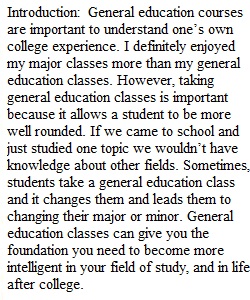


Q Instructions: Part 1: For this reflection paper, you will write a 6 - 8 page paper (not including title page and references page) that mainly consists of four short essays--one on the Humanities, one on the Social Sciences, one on the Sciences, and one on the Arts. See the prompts below for each essay as you should start drafting these well before this paper is due. Be sure to use headers to clearly label each essay (i.e. Essay #1 -- Humanities, Essay #2 -- Social Sciences, etc.). Each essay should be approximately at least one page in length (some may be longer, but shouldn't really be less). Part 2: In addition to the four short essays, the reflection paper should have an introduction (i.e. approximately 1 page before the essays) and conclusion (i.e. approximately 1 page after the essays) that explores the following questions: 1) Why are General Education courses ultimately important to understanding one's own college experience? 2) How do these areas (i.e. Humanities, Social Sciences, Sciences, and Arts) help us to better understand college cultures and environments. Part 3: Submit your completed paper with the introduction, four short essays, and conclusion all in one file here in Canvas. But also be sure to submit a copy of this paper to your General Education Portfolio in Canvas under the "Gen Ed Capstone" area. :) _____________________________________________________________________________________________________________________________________________ Short Essay #1 -- Humanities in College Cultures & Environments How does having knowledge of the humanities help us to understand college cultures and environments? In formulating your response, consider any humanities courses (i.e. philosophy, religion, art, music, history, language, etc.) you have taken as a college student from these disciplines. Be sure to address how the humanities allow us to learn more about the human (i.e. students, staff, faculty, etc.) experience and why this is important to a college setting. _____________________________________________________________________________________________________________________________________________ Short Essay #2 -- Social Sciences in College Cultures & Environments Why is it important for students to take courses from the social sciences (i.e. psychology, sociology, political science, economics, anthropology, etc.) as part of their college experience? In formulating your response, consider any social science courses you have taken as a college student from these disciplines. Be sure to address how the social sciences allow us to understand the relationships that exist between students, staff, faculty, etc. in a college setting and why this is important to an institution's culture and environment. _____________________________________________________________________________________________________________________________________________ Short Essay #3 -- Sciences in College Cultures & Environments Why is it important for students to take courses from the sciences (i.e. biology, chemistry, astronomy, physics, ecology, geology, meteorology, etc.) as part of their college experience? In formulating your response, consider any science courses you have taken as a college student from these disciplines--or any science course that you wish you could have taken (even if not offered at the college!). In your midterm research paper, you wrote about the physical environment/setting of the campus you visited virtually (i.e. you discussed the weather, physical grounds (i.e. dirt, grass, bumpy roads, etc.), age of buildings, climate, etc.). In your essay, be sure to also address this question: How does the natural (aka scientific) physical setting of a campus contribute to shaping its culture? Hint: Think about institutions located in very different geographic regions (i.e. University of Miami vs University of Vermont). _____________________________________________________________________________________________________________________________________________ Short Essay #4 -- Arts in College Cultures & Environments Why is it important for students to take courses from the arts (i.e. art, music, theatre, sculpture, painting, literature, performing, etc.) as part of their college experience? In formulating your response, consider any arts courses you have taken as a college student from these disciplines--or any arts course that you wish you could have taken (even if not offered at the college!). Think about "art" found on a college campus--examples may include signs on campus, photographs hanging on the walls in certain buildings, architecture of buildings on campus, the use of school colors and related graphics, etc. What can we learn about a college's culture and environment through these examples of "art"? _____________________________________________________________________________________________________________________________________________ Submission Instructions: Please copy and paste your completed paper here directly into Canvas by the end of the date specified (Due by – 11:59pm). IMPORTANT REMINDER: YOU ALSO NEED TO SUBMIT THIS PAPER SEPARATELY TO YOUR "GENERAL EDUCATION PORTFOLIO" IN CANVAS. SPECIFICALLY, SUBMIT THIS PAPER TO YOUR PORTFOLIO UNDER THE "GEN ED CAPSTONE" AREA :)
View Related Questions